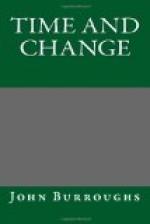Under the city of London is a vast deposit of clay in which thousands of specimens of fossil fruit have been found like our date, cocoanut, areca, custard-apple, gourd, melon, coffee, bean, pepper, and cotton plant, but no sign of man. Why was his development so tardy? What animal profited by this rich vegetable life? The hope and promise of the human species at that time probably slept in some lowly marsupial. Man has gathered up into himself, as he traveled his devious way, all the best powers of the animal kingdom he has passed through. His brain supplies him with all that his body lacks, and more. His specialization is in this highly developed organ. It is this that separates him so widely from all other animals.
Man has no wings, and yet he can soar above the clouds; he is not swift of foot, and yet he can out-speed the fleetest hound or horse; he has but feeble weapons in his organization, and yet he can slay or master all the great beasts; his eye is not so sharp as that of the eagle or the vulture, and yet he can see into the farthest depths of siderial space; he has only very feeble occult powers of communication with his fellows, and yet he can talk around the world and send his voice across mountains and deserts; his hands are weak things beside a lion’s paw or an elephant’s trunk, and yet he can move mountains and stay rivers and set bounds to the wildest seas. His dog can out-smell him and out-run him and out-bite him, and yet his dog looks up to him as to a god. He has erring reason in place of unerring instinct, and yet he has changed the face of the planet.
Without the specialization of the lower animals,—their wonderful adaptation to particular ends,—their tools, their weapons, their strength, their speed, man yet makes them all his servants. His brain is more than a match for all the special advantages nature has given them. The one gift of reason makes him supreme in the world.
VI
We have a stake in all the past life of the globe. It is no doubt a scientific fact that your existence and mine were involved in the first cell that appeared, that the first zoophyte furthered our fortunes, that the first worm gave us a lift. Great good luck came to us when the first pair of eyes were invented, probably by the trilobite back in Silurian times; when the first ear appeared, probably in Carboniferous times; when the first pair of lungs grew out of a fish’s air-bladder, probably in Triassic times; when the first four-chambered heart was developed and double circulation established, probably with the first warm-blooded animal in Mesozoic times.
These humble forms started the brain, the nervous system, the circulation, sight, hearing, smell; they invented the liver, the kidneys, the lungs, the heart, the stomach, and led the way to every organ and power my body and mind have to-day. They were the pioneers, they were the dim remote forebears, they conserved and augmented the fund of life and passed it along.




